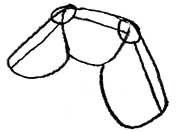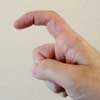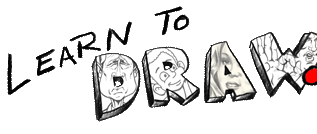Now you're fairly comfortable with drawing simple
contours of hands, correct? But what people freak out
about when drawing hands is drawing the fingers. Now
hold on there, calm down, we'll get through this. We'll take it slow.
If we do what we've been doing and start simple and
build up to more complex ideas, you'll do fine.
 |
As you know, a human
finger is divided into three segments.
The first two segments are cylindrical
in shape, and the finger tip segment is
roughly a rounded-off cone shape. Here,
we're looking down at the top of one of
the two first segments. The top of this
shape, which is the back of the finger
is somewhat flat, and the bottom, which
faces the palm is a rounder shape. |
|
 |
|
|
 |
Now we've drawn a finger and
it already looks more realistic than many
fingers that you've seen many other people draw.
But the reason some drawings of fingers don't
look right is because they are bent in an arc,
as
 if
the fingers didn't have joints. It looks like a
rubber glove filled with water. So if we take
the finger we just drew and imagine that it has
a if
the fingers didn't have joints. It looks like a
rubber glove filled with water. So if we take
the finger we just drew and imagine that it has
a rod (or bone!) with two joints, or hinges, along the top of
the finger. Now you can see how the finger is
supposed to bend. And because the muscles and
skin of the finger are soft and pliable, when
the finger bends down and curls in on itself,
all three segments of the finger become more
wedge shaped and fatter. The middle segment's
soft tissues will become compressed the most as
the finger curls because it's in the middle and
the other two segments are basically crowding
and squishing the middle segment.
rod (or bone!) with two joints, or hinges, along the top of
the finger. Now you can see how the finger is
supposed to bend. And because the muscles and
skin of the finger are soft and pliable, when
the finger bends down and curls in on itself,
all three segments of the finger become more
wedge shaped and fatter. The middle segment's
soft tissues will become compressed the most as
the finger curls because it's in the middle and
the other two segments are basically crowding
and squishing the middle segment.
 |
|
Click to enlarge |
 Using what you've just learned, you should be
able to draw this bent index finger. Never mind
all the fine details like the shadows and the
wrinkles, and the other fingers that you see,
just do a quick sketch and see
if you can draw the single index finger. This
finger is showing only two dimensions, so draw
it sort of like the way I drew the index finger
just above, but you don't need to draw the "rod
and hinges" like I did. Using what you've just learned, you should be
able to draw this bent index finger. Never mind
all the fine details like the shadows and the
wrinkles, and the other fingers that you see,
just do a quick sketch and see
if you can draw the single index finger. This
finger is showing only two dimensions, so draw
it sort of like the way I drew the index finger
just above, but you don't need to draw the "rod
and hinges" like I did.
|
|
